Exercising Your Weakness

'Most of this case has involved helping you find a 'detour' around your learning disability. In other words, we have been uncovering clues about how to 'get around' or avoid your learning disability so that it does not interfere so much with your life.'
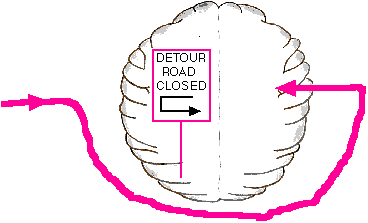
'Unfortunately, when we avoid using a weakness, it usually just keeps getting weaker and weaker. If that is true, then it may also be true that your processing weakness can be strengthened if you just force yourself to use it.'
This chapter is all about what you can do to try to strengthen your weak processing skills. This isn't easy. You have spent your whole life figuring out how to avoid things that are difficult or make you feel dumb. But maybe, with a little hard work, these things will become less difficult, maybe even fun.
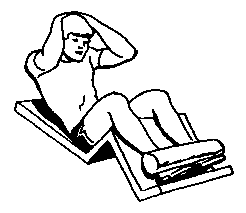
It is pretty easy to figure out what kinds of activities you might need to do. For the most part, they will be activities that are difficult for you. It is kind of like physical exercise - if it isn't at least a little difficult, it probably isn't doing you much good.
But we are going to try to make it as fun as possible, so most of the activities are more like games than work.
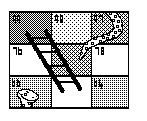
Find your area of processing disability below and see what kinds of activities you might try in order to strengthen that area.
Visual Processing DisabilityAuditory Processing Disability
Sequential Processing Disability
To strengthen a visual processing weakness, you need to force yourself to process more and more visual information. You might want to try some of the following activities, either by yourself, with your family, or with friends:
1. Plug your ears while watching television. Can you figure out what is going on just by watching?
2. Do jigsaw puzzles. 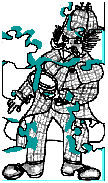
3. Build with blocks or 'Legos'.
4. Draw or paint pictures.
5. Close your eyes and visualize something, anything.

6. Picture letters, numbers, and words in your mind.
7. Look at a picture, take it way, and try to remember everything you saw.
8. Use playing cards to play a memory game. Place all the cards face down then try to find two with matching numbers.
9. Find as many things as you can see of a certain shape (circle, square, rectangle, triangle).
10. Solve scrambled words or sentences.
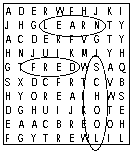
11. Find 'hidden' words within words.
12. Imitate a series of movements made by someone else.
13. Figure out what dot-to-dot pictures are before you connect the dots.
14. Find the mistakes in 'What's wrong with this picture' pictures.
15. Sort playing cards in different ways (color, suit, number).
16. Look for patterns (like faces, animals, etc.) in clouds, rocks, plants, etc.
17. Make or solve mazes.
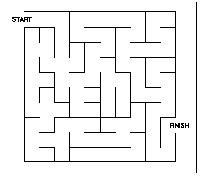
18. Cut apart comic strips, mix, and put them back in the correct order.
Auditory Processing Disability:
To strengthen an auditory processing weakness, you need to force yourself to process more and more auditory information. You might want to try some of the following activities either by yourself, with your family, or with friends:
1. Close your eyes and just listen to an entire television show. Can you figure out what is going on?
2. Spend more time listening to the radio instead of watching music videos.

3. Be very quiet and see how many different sounds you can hear.
4. Listen to yourself read outloud.
5. With a friend, try to repeat a made-up series of numbers or letters.
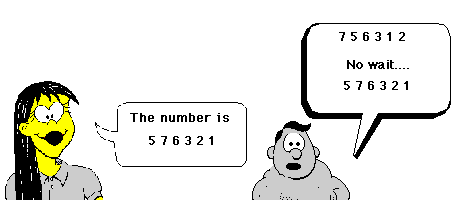
6. With a friend, try to repeat sentences word-for-word.
7. Close your eyes while listening to your friends or family. Can you tell who is talking?
8. Say days of the week in order, starting from different points.
9. Close your eyes and try to imagine the voices of friends or family.
10. Quickly name the months of the year backward.
11. Quickly say the days of the week backward.
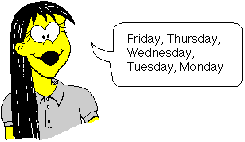
12. Try to sing or hum a new song.
13. Listen to songs and try to remember all of the words.
14. Say the letters of the alphabet in order, starting from different points.
15. Say the alphabet backward.
16. Follow several commands that a friend gives you.
17. Turn the volume very low on the radio. Listen very carefully and see if you can understand what you hear.
Sequential Processing Disability:
To strengthen a sequential processing weakness, you need to force yourself to process more and more sequential information. You might want to try some of the following activities either by yourself, with your family, or with friends:
1. Put first names of family, friends or classmates in alphabetical order.
2. Identify objects in a room that begin with each letter of the alphabet, from A to Z.
3. Say days of the week in order, starting from different points. Try it backward.
4. Say the months of the year in order starting from different points. Try it backward.
5. Listen to songs and try to remember all of the words.
6. Say the letters of the alphabet in order, starting from different points.
7. Say the alphabet backward.
8. Follow several commands that a friend gives you.
9. Pick a letter in the alphabet and quickly tell which letter comes before and after it.
10. With a friend, try to repeat series of numbers, letters, or words.
11. Repeat sentences word-for-word.

12. Look at any person or object and describe all the details you see.
13. Solve all of the 'clues' in a detective mystery.
14. Play the game 'Clue'. Can you remember the clues without writing them down?
15. Follow a set of directions for cooking, building a model, etc.
16. Try to remember as many names as possible from television shows, movies, or stories.
17. Try to remember the TV schedule for one channel on one day. Then try two channels or two days.
18. Memorize directions to school, a friend's house, to the Mall, etc.
19. Try to remember birthdates of family or friends.
20. Imitate a series of movements made by a friend.
21. Use playing cards to play a memory game. Place all the cards face down then try to find two with matching numbers.

Conceptual Processing Disability:
To strengthen a conceptual processing weakness, you need to force yourself to process more and more conceptual information. You might want to try some of the following activities either by yourself, with your family, or with friends:
1. Use the letters in your name to make as many words as possible. Try it with other names.
2. Write all the rhyming words that you can think of.
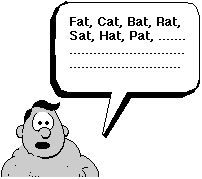
3. Be very quiet and see how many different sounds you can hear.
4. Try to think of all the words that start with each letter in the alphabet from A to Z.
5. Figure out what a dot-to-dot picture is before you connect the dots.
6. Solve 'Find the hidden objects' pictures without using any clues about what is hidden.
7. Solve word mazes or word-finds where you circle words that you find either up/down, across, or diagonally.

8. Find the mistakes in 'What's wrong with this picture' pictures.
9. Sort playing cards in different ways (by color, suit, number).
10. Look for patterns (like faces, animals, etc.) in clouds, rocks, plants, etc.
11. Make or solve mazes.

12. While reading a story, stop and predict what might happen next. Think of as many possibilities as you can.
13. Look at an object and think of all the different ways it could be used.
14. Solve puzzles, any kind.
15. Before going anyplace (the Zoo, Mall, etc.) think of all the things you might see.
16. Read riddle or joke books. Figure out what is so funny.
17. Think about 'what if' questions (like what if TV didn't exist?).
18. Play games of strategy like chess, checkers, etc.

19. Do 'mind bender' or 'brain teaser' puzzles.
In order to strengthen a processing speed weakness, you need to force yourself to process information more quickly. This can involve any type of game or activity in which you compete with someone (or even a computer, or yourself) to complete a task as quickly as possible. You might want to try some of the following activities either by yourself, with your family, or with friends. And remember to either time yourself and try to improve your time or compete with someone to see who can do the activity the fastest:

1. Quickly solve scrambled words or sentences.
2. Find all the mistakes in 'What's wrong with this picture' pictures, as fast as you can.
3. Sort playing cards in different ways (color, suit, number). Time yourself.
4. Solve mazes. Time yourself.
5. With a friend, try to repeat a made-up series of numbers or letters, as fast as you can.
6. With a friend, try to repeat sentences word-for-word, as fast as you can. Try tongue twisters.
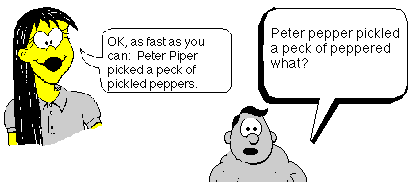
7. Quickly say days of the week in order, starting from different points.
8. Quickly name the months of the year backward.
9. Quickly say the days of the week backward.
10. Quickly say the letters of the alphabet in order, starting from different points.
11. Quickly say the alphabet backward.
12. Pick a letter in the alphabet and quickly tell which letter comes before and after it.
13. Solve word mazes or word-finds where you circle words that you find either up/down, across, or diagonally. Time yourself.

14. Solve puzzles of any kind.
15. Play games of strategy like chess, checkers, etc. Have a time limit for each move.
16. Play computer or video games.
17. Play a tape recorder at fast speed. Can you understand the words?
18. Time yourself doing any activity (making your bed, taking out the trash, etc.). Try to improve your speed each time.
19. Time yourself while reading a short story or even a paragraph. Keep trying to read it faster and faster.

Wow!!! I'm really tired now! Some of those 'fun' activities are harder than they look. But if you keep practicing, they will probably get easier and easier.
And it sounds like some of these activities might actually make learning a little easier for you too. It's worth a try, isn't it?
'I think we've worked hard enough on this chapter. Let's skip the review questions, shall we?'
Return to the LDinfo Web Site to find out about any of the following topics (and more):
Learning disabilities - what is a learning disability (LD or SLD)?
Dyslexia: Dyslexia is a reading disability or reading disorder
Dysgraphia Dysgraphia is a writing disability or disorder
Dyscalculia Dyscalculia is a math disability or disorder
What is an attention deficit disorder (ADD, AD/HD, ADHD)?
Gifted LD: Can a student be gifted and LD?
Emotional/Behavioral issues and LD: Do LD students experience behavior problems or depression?
Section 504: What is a Section 504 plan?
What is special education?
What is processing?
What is a severe discrepancy?
What is a nonverbal learning disability (nonverbal LD or NLD)?
What is a central auditory processing disorder (CAPD)?
Uncovering the Mysteries of your Learning Disability
Order printed copies of this manual
- Chapter 1 - What is a Learning Disability?
- Chapter 2 - What Causes Learning Disabilities?
- Chapter 3 - Discrepancy = Underachievement
- Chapter 4 - Processing: The Sensory Channels
- Chapter 5 - Processing: The Cognitive Channels
- Chapter 6 - Processing: Sensory + Cognitive
- Chapter 7 - LD Jargon
- Chapter 8 - Using Accommodations
- Chapter 9 - Other Issues Related to LD
- Chapter 10 - Intelligence vs IQ
- Chapter 11 - Exercizing Your Weakness
- Chapter 12 - LD and the Law
- Chapter 13 - Becomming an Effective Self-Advocate
- Chapter 14 - Planning for Your Future
- Chapter 15 - The Summary
Copyright © 2006-2017 LDinfo Publishing
All rights reserved. Any reuse or republishing of the text
or images on this web site without prior written consent of
the copyright holder is prohibited.